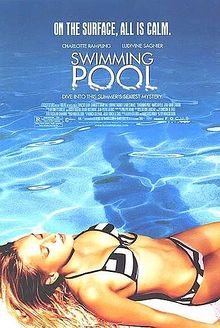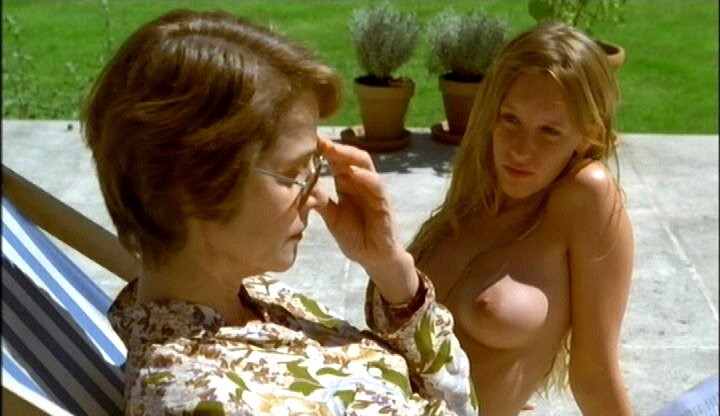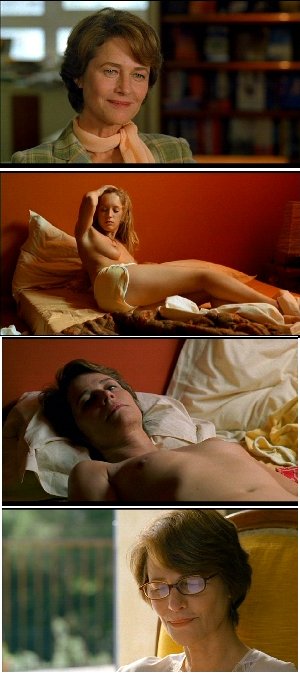 www.socalnaturist.org |

|
The Movie BuffTM:
|

|
Name of Film:
SWIMMING POOL
Our Rating:
Running time: 102 min (European version), 94 min (American version)
Charlotte Rampling plays Sarah Morton, a British crime novelist, who is trapped by her own success. She dislikes being recognized in public and she is annoyed at her publisher because he sees her as a cash cow instead of as a writer experiencing a creative meltdown. The publisher (Charles Dance) offers her a holiday in his French villa, to recharge her batteries and also to crank out another crime novel for him. She goes gratefully to the house, shops in the nearby village, finds she can write again. At first, the secluded place, with its wooded grounds and secluded swimming pool, are perfect.
Then an unexpected visitor turns up: Julie (Ludivine Sagnier), the daughter that Sarah's publisher didn't think to tell her about. Sarah is annoyed, her privacy violated. Sarah's attempts to establish boundaries are continually flouted by the oversexed Julie, who brings a new man home every night and keeps Sarah awake with the sounds of her lovemaking. Julie like to spend much of her days nude or nearly so. She sunbathes topless at the villa's swimming pool and interrupts Sarah’s attempts to keep writing. It all seems perfectly natural to Julie but Sarah is appalled.
Sarah becomes increasingly sour-tempered and disapproving of Julie, yet at the same time she becomes intriqued about the young woman. She looks down from high windows, spying on the girl who seems so indifferent to her opinion. Sarah's fascination starts to border on obsession. Eventually she even steals glimpses of the girl's diary and finds she is hiding some personal demons.
The title of the movie comes from the supporting role the swimming pool at the villa has in the story. The swimming pool is used as a symbolic cue, which can represent the unfolding of Sarah’s novel, or it can represent the friendship blooming between Julie and Sarah, or it can represent the opening up of Sarah to a part of her creative self she had yet to explore. The pool starts out covered and goes through various stages of being uncovered, cleaned and then finally fully enjoyed as the centerpiece of the story. Julie swims in the pool when it is still half-covered, a little dirty and covered in leaves. Sarah waits until the pool is completely uncovered and totally clean before she finally allows herself to venture towards the water. But when she does, she embraces the pool with a growing passion.
At this point the film takes a sudden violent turn as Julie accidentally kills one of her lovers. The cool Sarah knows just what to do, having written about it many times in her books. The two women decide to bury the man and keep the murder secret…if they can.
There is one moment late in the film that displays Sarah's cool audacity more than any other. The caretaker becomes a little too curious, and what she does to startle and distract him is bold and surprising, not just for Sarah but for Rampling, the actress.
When her novel is complete, she lets her publisher know that she’s not only finished the book, but its been published by another house. The insinuation is that she prefers to be supported as an artist, and not merely as that "cash cow."
Then comes the plot twist. There are plenty of hints about what's going on within the movie (the cross being removed from the bedroom wall more than once), but those will mostly be missed or dismissed by even alert viewers. Critics and confused viewers have offered many interpretation of the movie, but if you watch it a second time (as most of us have in order to find the clues) there is really only one interpretation that resolves all of the difficulties, but if I told you, you would have to kill me.
This movie is as much about the writing process as it is about Sarah’s transformation. Julie is a static character, who, while richly drawn, beautiful, fun, sensuous and a bit dangerous, she exists to move Sarah forward. Swimming Pool is really Sarah’s story. It is an intriguing, sensual film about the difference experience makes in one’s approach to life and how the traditional inflexibility of age can give way to powerful, positive change.
|
Review by Gary Mussell, SCNA Film Critic
Email Us Your Comments About This Review

